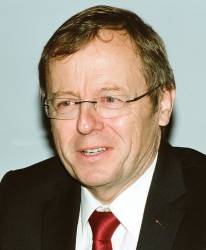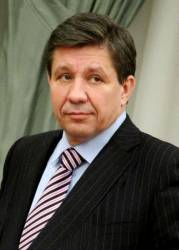 ESA’s Johann-Dietrich Wörner
ESA’s Johann-Dietrich WörnerESA renewed its New Year’s tradition, briefing the news media on January 15 at the European Space Agency headquarters in Paris, with the agency’s new director general, Johann-Dietrich Wörner, presiding for the first time..
The contrast with his predecessor, the well-liked Jean-Jacques Dordain, is clear but not stark. Wörner is a bit more whimsical than Dordain, but not too much. His presentation features a few more cartoons, he makes a few more jokes, and there is a picture of the Star Trek (Next Generation) crew to make us chuckle.
ESA renewed its New Year’s tradition, briefing the news media on January 15 at the European Space Agency headquarters in Paris, with the agency’s new director general, Johann-Dietrich Wörner, presiding for the first time..
The contrast with his predecessor, the well-liked Jean-Jacques Dordain, is clear but not stark. Wörner is a bit more whimsical than Dordain, but not too much. His presentation features a few more cartoons, he makes a few more jokes, and there is a picture of the Star Trek (Next Generation) crew to make us chuckle.
Captain Jean-Luc Picard was, after all, a Frenchman, Wörner explains, and he was portrayed by a British actor, thus confirming Europe’s long heritage as a continent of space pioneers. Certainly something to think about.
Wörner brings new ideas and his own energy. “A German is not just a Frenchman who speaks German,” he insists.
Cooperation is a key word for the new ESA boss. Even his idea for a “Moon Village,” he explains, is really mostly about creating a cooperative space, “where people can come together, work, and exchange ideas.”
By the way, Wörner says he was glad to hear Jerzy Buzek call his Moon Village crazy, “because sometimes you need a crazy idea.” It makes you think, it raises new questions.
Going a step further, Wörner says he sees ESA as a broker, a mediator, an enabler of global cooperation.
“We work with the U.S., Russia and China, and with many others, nations that have different objectives, competencies, and cultures. We know how to do this because ESA is already a diverse organization itself, with different Member States, with different objectives, specialties and cultures.”
Woerner displays an image of the most recent space crew preparing to fly to the International Space Station, composed of ESA astronaut Tim Peake, NASA astronaut Tim Kopra, and cosmonaut commander Yuri Malenchenko.
“Isn’t it extraordinary,” says Woerner, “that we have here a U.S. astronaut, a Russian cosmonaut, and a European astronaut, working together as a team at a time of global crisis?”
Civil or Military, Again
The civil nature of Galileo was always and continues to be cited as one of its main reasons for being. Europe had to build it, the story goes, because the existing systems, GPS and GLONASS, were run and controlled by national military agencies.
Asked whether it matters today that GPS is run by the Pentagon, Wörner replies, “I don’t care if GPS is military. It’s an open signal and it works. On our side we have a civilian Galileo program, and that’s good too.”
He insists, “Galileo is not against GPS.” This is not about competition — except on the technical level — because, yes, everyone wants their system to be the best, and just to illustrate this we are already talking about the next generation of Galileo.”
For his part, redundancy is an important asset, Wörner says. “It is much better to have two systems than to have one.”
He confirms one thing the EC crowd is saying about Galileo: initial services are on the way. The next Galileo launch will not take place until October, “but for the first time we will see four satellites — Galileos 13, 14, 15 and 16 — going up at the same time, on board the Ariane-5 launcher.” It promises to be a spectacular event.
Free Galileo?
Wörner wishes everything didn’t have to come down to euros. He wonders aloud, “If Albert Einstein had lived in our time, when all we wait for is the next iPhone, would anyone have agreed to pay him to develop his theory of relativity?”
Space is not expensive, he argues, but, we ask, should Europeans really be paying billions, footing the entire bill themselves, for a system that will benefit the whole world?
“Does it always have to be about return on investment?” Wörner counters. “Did the Americans ask if they should pay the cost of GPS? No European should be worried about paying for Galileo users in South America.”
Wörner provides some further insight into his thinking about a different question on the availability of free data. Wörner reminds his audience that he is still a professor and that he has been in situations where colleagues have urged him to keep his own research results under wraps rather than publishing too quickly and possibly giving his competition a leg up.
“If you are afraid to publish data because you think someone else might be able to use it faster than you can your self,” he says, “then you have a problem.”
Finally, journalists being the troublemakers that they are, one of them asks, “Who’s really in charge, the European Commission or ESA?” Wörner shakes his head and answers, “It’s like a marriage. It’s really an equal partnership. Neither one is the boss . . . but don’t tell my wife I said that!”





